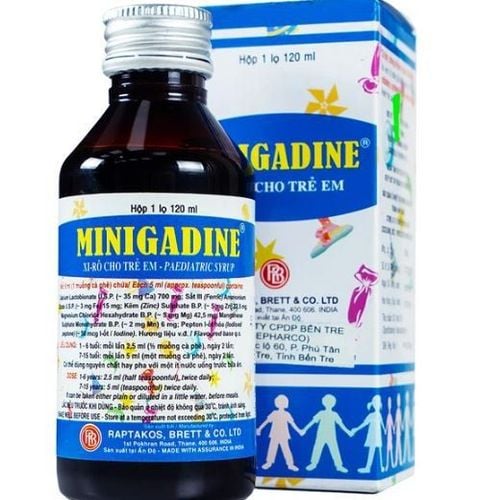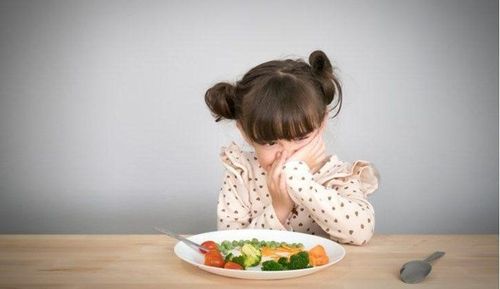This is an automatically translated article.
Physiological anorexia in 7-month-old children is a common condition, because at this stage the child is entering the weaning period and there are changes in both cognition and physical activity. So what should parents do to improve physiological anorexia in 7-month-old children? Today's article will help you figure out the above problem.
1. What symptoms does a 7-month-old anorexic child have?
Physiological anorexia in 7-month-old children is a common eating disorder and they cause children to eat less, refuse to eat, thereby not absorbing enough necessary nutrients, leading to the risk of malnutrition and malnutrition. underdeveloped. Symptoms of anorexia in children are as follows:
Each meal for a child usually lasts more than 30 minutes, even hours. Children refuse to chew or swallow food, instead sucking on food for long periods of time. Children resist and refuse to eat such as closing their mouth, shaking their head or crying when it is time to eat. Your baby's food intake is less than that of his peers. Children slowly gain weight and height, sometimes even lose weight for a long time. Babies get sick easily.
2. Causes of physiological anorexia in 7-month-old children
7 months old baby is entering the weaning stage and has many changes in cognition and physical activity. Therefore, physiological anorexia in 7-month-old children is a common condition and it is caused by the following causes:
2.1. Children who are not used to solid foods Many children are not used to solid foods because at this stage they have just switched from breast milk to complementary foods. Therefore, "weaning foods" are sometimes quite strange and different from breast milk, making babies not yet adapted to meals, so the natural reaction is to spit out and refuse to swallow.

Biếng ăn sinh lý ở trẻ 7 tháng tuổi là tình trạng thường gặp
2.2. Teething stage From 6 months old, babies start teething stage. At this stage, children often feel uncomfortable in their bodies and have manifestations such as irritability, fussiness, salivation, sucking, sucking on objects, swollen and painful gums.. making children not want to chew and swallow. food, leading to anorexia.
2.3. Due to the influence of diseases, the immune system in young children is not as complete as in adults, so their resistance is still weak, and they are easily attacked by viruses and bacteria that cause diseases such as pharyngitis, bronchitis, colds, and flu. flu...which makes the baby tired, anorexic and anorexic.
Besides, digestive pathological conditions such as diarrhea, constipation, indigestion, abdominal distention, intestinal dysbacteriosis... also affect the digestion and absorption of food, leading to Anorexia in 7 month old children.
2.4. Children's diet is not reasonable Children at the age of 7 months, breast milk is still the main source of nutrition. Therefore, parents should not completely replace breast milk with weaning meals, this will affect nutritional needs and children cannot adapt, leading to anorexia.
Besides, many parents have not built a reasonable diet for their baby. For example, the distance between weaning meals, between meals and feedings is too close or the food in the meal is improperly prepared, parents force the baby to eat... also causes boredom. eating, physiological anorexia in 7-month-old children.
2.5. Effects from side effects of drugs Physiological anorexia in 7-month-old babies can be caused by drug use. Some drugs that affect the absorption of food in children such as taking a lot of antibiotics will disrupt the intestinal microflora, taking a lot of vitamins or stimulant drugs does not bring good results, but also makes the situation worse. The child's anorexia increased immediately after stopping the drug.
2.6. Children with intestinal bacterial disorders, digestive disorders The digestive system in 7-month-old children is not fully developed and immature, so it is easy to be attacked by bacteria and disrupt the beneficial microflora in the intestinal tract, especially especially after the use of antibiotics. Digestive disorders in children often have manifestations such as bloating, constipation, dyspepsia, vomiting, diarrhea, poor absorption, anorexia and anorexia.
2.7. Children are deficient in micronutrients Vitamins and nutrients play an important role in the development of both physical and intellectual children. Accordingly, one of the causes leading to the physiological anorexia period in 7-month-old children is the lack of vitamins and nutrients such as vitamins A, D, calcium, iron... especially vitamin B1 has an increasing role. Metabolize food and stimulate taste, helping children eat more appetizing.
Besides, environmental factors such as dust attack, noisy living environment, weather... also affect the child's diet.
3. How to limit physiological anorexia for 7-month-old children?
Physiological anorexia in 7-month-old children is the top concern of parents, because this condition greatly affects the child's development. So what strategies should be put in place to help limit anorexia in children? Accordingly, parents need to rely on the cause of anorexia in children to have different solutions. However, the general strategy can include the following solutions:3.1. Children's menus need to be rotated. Nutritional menus play an important role in the physical and intellectual development of children. Children 7 months old are entering the eating stage, so they are very sensitive and begin to perceive the taste of food. Therefore, the mother should regularly change the portion of each meal for the baby to avoid eating one dish continuously for a long time, which will cause anorexia, or the situation of supplementing with this nutrient but not eating. lack of other nutrients. The baby's nutrition needs to ensure a full range of nutrients including starch (rice, wheat...), lipids (peanut, sesame, animal fat..), protein (shrimp, fish, meat). ), fiber, vitamins and minerals (green vegetables, tubers, fruits..). For 7-month-old children with anorexia, mothers should build a menu for the child with foods such as beef, salmon, shrimp, chicken... of clear origin and ensure freshness, limited Use canned or processed foods because they contain preservatives that adversely affect your baby's health.

Một thực đơn đa dạng và hấp dẫn sẽ giúp hạn chế tình trạng biếng ăn sinh lý ở trẻ em 7 tháng tuổi
In the period when babies are just starting to eat solid foods, mothers should give them separate foods that are most similar to the type of milk they are using with the amount from little to a lot, from thin to thick so that the baby can get used to the food. .
A nutritious diet will help stimulate your child's taste buds. For example, the vitamins and minerals in food help children eat better. Many studies have shown the role of zinc in stimulating children's appetite. Supplementing with zinc for children can be zinc available in food or through culture technology, which is still guaranteed to be natural, easy to absorb, so it is safe for the baby's health. Many foods contain zinc such as chicken, oysters, shrimp, crab, and dark green vegetables. In addition, the baby needs to be supplemented with necessary micronutrients including: Vitamins B1 and B6, Selenium, Chromium, Ginger, acerola fruit extract (vitamin C),... achieve the right weight and height and exceed the standards, have a good immune system, strengthen the resistance to get sick less often and have fewer digestive diseases.
3.2. In case the wrong diet makes the child anorexic In order to limit the physiological anorexia in 7-month-old children due to the wrong diet, parents need to pay attention to a number of issues when feeding children as follows:
The time for each meal should be about 25-30 minutes and the interval between the last snack or feeding to the main meal is 2 - 2.5 hours. Parents should practice feeding their baby from liquid to solid food, from small to large amounts of food. Practice giving children a serious diet, do not turn on the TV or phone, play with toys while eating. Besides, parents should not scold, force the child to eat when he is not ready. Mothers should encourage and encourage the baby and create a happy and comfortable atmosphere during the meal to help the baby excitedly and self-consciously eat more. 3.3. In case the child is anorexic due to gastrointestinal problems pepper for babies such as sweet potatoes, bananas, etc. especially yogurt to help supplement beneficial bacteria for the intestinal tract. In addition, parents can use probiotics for babies to help improve the immune system, enhance beneficial bacteria, and prevent digestive disorders such as constipation, bloating, indigestion, and indigestion. diarrhea...
In case the child's anorexia persists for a long time due to digestive disorders causing the baby to cry, fever, and abdominal pain, parents should take the child to a medical facility for examination and indications. exactly.
3.4. In case of anorexia due to teething, the teething stage may cause mild fever, fussiness due to swollen gums, pain and itching more than usual. Therefore, parents should not force their children to eat during this time.
For physiological anorexia in 7-month-old children, the improvement of symptoms can take place for a long time, so it is recommended that parents be patient and calm when supplementing with nutrients, even on the go. food or functional foods. Especially when using functional foods, it is recommended that parents choose foods of natural origin that are easy to absorb, and do not allow multiple types of food to be used at the same time or continuously change types of dietary supplements.
Parents can simultaneously apply dietary supplements and functional foods derived from nature for easy absorption. The most important thing is that improving your baby's symptoms often takes a long time. Combining many types of functional foods at the same time or changing many types in a short time can make the baby's digestive system unable to adapt and completely not good. Therefore, parents must be really patient with their children and regularly visit the website vimec.com to update useful baby care information.













